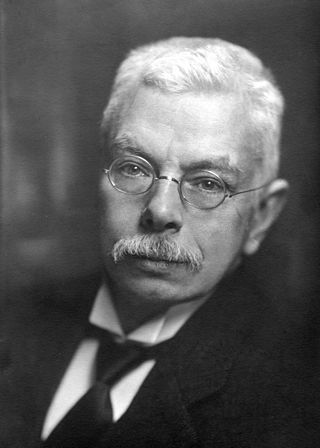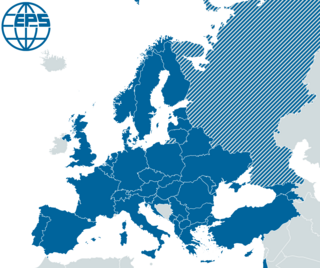
Pieter Zeeman was a Dutch physicist who shared the 1902 Nobel Prize in Physics with Hendrik Lorentz for his discovery of the Zeeman effect.
The Institute of Physics (IOP) is a UK-based not-for-profit learned society and professional body that works to advance physics education, research and application.

The Dutch public broadcasting system is a group of organizations that are responsible for public service television and radio broadcasting in the Netherlands. It is composed of the Nederlandse Publieke Omroep (NPO) foundation, which acts as its governing body, and a number of public broadcasters. The Dutch Media Act 2008 regulates how air time is divided and puts the administration of the public broadcasting system in the hands of the NPO Board of Directors.

Robertus Henricus "Robbert" Dijkgraaf, is a Dutch theoretical physicist, mathematician and string theorist, and the Minister of Education, Culture and Science in the Netherlands from 2022 until 2024. From July 2012 until his inauguration as a minister, he had been the director and Leon Levy professor at the Institute for Advanced Study in Princeton, New Jersey, and a tenured professor at the University of Amsterdam.

Hendrik Brugt Gerhard Casimir was a Dutch physicist who made significant contributions to the field of quantum mechanics and quantum electrodynamics. He is best known for his work on the Casimir effect, which describes the attractive force between two uncharged plates in a vacuum due to quantum fluctuations of the electromagnetic field.
Physical Chemistry Chemical Physics is a weekly peer-reviewed scientific journal publishing research and review articles on any aspect of physical chemistry, chemical physics, and biophysical chemistry. It is published by the Royal Society of Chemistry on behalf of eighteen participating societies. The editor-in-chief is Anouk Rijs,.

Leonard Salomon Ornstein was a Dutch physicist.

The European Physical Society (EPS) is a non-profit organisation whose purpose is to promote physics and physicists in Europe through methods such as physics outreach, supporting physicists to engage in the design and implementation of European science policy, and advocating physics research. Formally established in 1968, its membership includes the national physical societies of 42 countries, and some 3200 individual members. The Deutsche Physikalische Gesellschaft, the world's largest and oldest organisation of physicists, is a major member.

Edward Peter Jacobus (Ed) van den Heuvel is a Dutch astronomer and emeritus professor at the Astronomical Institute Anton Pannekoek of the University of Amsterdam.
The Royal Netherlands Chemical Society is a learned society and professional association founded in 1903 to represent the interests of chemists and chemical engineers in the Netherlands. Currently the organisation has approximately 7,400 members.
Physica is a Dutch series of peer-reviewed, scientific journals of physics by Elsevier. It started out in 1921 as a journal of the Nederlandse Natuurkundige Vereniging that published mostly in Dutch. In 1934 it was taken over by the North-Holland Publishing Company, keeping the same name but with a new volume numbering. The single journal Physica was split in a three-part series in 1975. Physica D was created in 1980, and Physica E in 1998. It was published in Utrecht until 2007, and is now published in Amsterdam by Elsevier.
The Nederlandse Malacologische Vereniging (NMV), known in English as the Netherlands Malacological Society or the Dutch Malacological Society, is a non-profit organisation based in the Netherlands. It is a society devoted to malacology as well as conchology. The NMV was founded in 1934 whichd include both professionals and amateurs members. The NMV created a European malacological society which later became the global society Unitas Malacologica.

Herman Haga was a Dutch physicist.

Pieter Hendrik van Cittert was a Dutch physicist and science historian. He was born in Gouda, Netherlands, to Benjamin Pieter van Cittert and Petronella Antonia Huber, and died on October 8, 1959, in Utrecht. His achievements include proving the van Cittert–Zernike theorem about the coherence of radiation and founding the University Museum in Utrecht.
The Belgian Physical Society (BPS) is the national physical society of Belgium, member of the European Physical Society. As a national scientific charity, its goal is to promote physics, advance physics education & research and support physicists in Belgium.

Scholarly communication of the Netherlands published in open access form can be found by searching the National Academic Research and Collaboration Information System (NARCIS). The web portal was developed in 2004 by the Data Archiving and Networked Services of the Dutch Research Council (NWO) and Royal Netherlands Academy of Arts and Sciences.
Universiteiten van Nederland (UNL), previously Vereniging van Universiteiten until November 2021, is a trade group of government-funded research universities, including three special universities, and the Open University of the Netherlands. It formed as the Vereniging van Samenwerkende Nederlandse Universiteiten in 1985, as a successor to the Academische Raad.
Joan Henri van der Waals was a Dutch physicist. He was professor of experimental physics at Leiden University between 1967 and 1989. He specialized in molecular physics and clathrate hydrates. One of van der Waals's most significant contributions to the study of hydrates was a series of papers between 1953 and 1958, which eventually culminated in the 1959 publication of his paper on the canonical partition function for clathrates, along with J. C. Platteeuw. To create this partition function, van der Waals made a number of simplifying assumptions, most prominently that neighboring guest gas molecules cannot interact and there is a maximum of one guest per cage.
The Descartes-Huygens Prize is an yearly scientific prize created in 1995 by the French and the Dutch governments, and attributed to two scientists of international level, a French one chosen by the Koninklijke Nederlandse Akademie van Wetenschappen and a Dutch one chosen by the Académie des sciences, to reward their work and their contributions to the French-Dutch cooperation.









